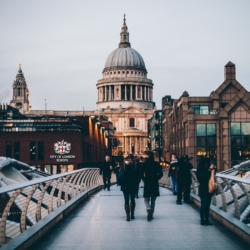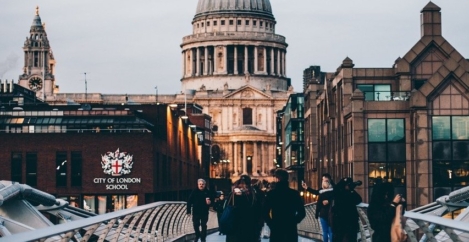July 7, 2020
London tops rank of smartest cities in the world
 London has once again been declared the smartest city in the world, according to the seventh edition of the IESE Cities in Motion Index 2020. New York takes the second spot, followed by Paris. The top 10 list is rounded out by Tokyo, Reykjavik, Copenhagen, Berlin, Amsterdam, Singapore and Hong Kong.
London has once again been declared the smartest city in the world, according to the seventh edition of the IESE Cities in Motion Index 2020. New York takes the second spot, followed by Paris. The top 10 list is rounded out by Tokyo, Reykjavik, Copenhagen, Berlin, Amsterdam, Singapore and Hong Kong.
Prepared by IESE Business School´s Center for Globalization and Strategy and co-authored by professors Pascual Berrone and Joan Enric Ricart, the annual index analyses the level of development of 174 world cities across nine dimensions* considered key to truly sustainable cities.
According to the report, London’s No. 1 ranking is due to it being well placed in almost all the ranking´s dimensions: it comes in first place for human capital (which looks at a city´s ability to attract, nurture and develop talent) and international projection, second place for governance and urban planning, and is in the top 10 for the dimensions of mobility and transportation, and technology. Its worst performance can be seen in the dimensions of social cohesion (64th), and the environment (35th)
London, which houses more start-ups and programmers than almost any other city in the world, has continually done well on the annual index, ranking first since 2017. But, with cities being hit hard by the Covid-19 pandemic however, the authors caution that for London to maintain its strong performance in the index, it must heed their seven recommendations for how to ensure sustainable and resilient cities. According to them, this is crucial “both to ensure a strong recovery after the pandemic, and ensure it is well prepared for similar global crisis in the future.”
“This crisis represents an opportunity to rethink many cities’ strategies and increase their resilience. To do this, factors such as greater public-private collaboration, as indicated by our index, will be key”, they add.
The UK´s smartest cities
Apart from London the next highest performing UK cities are Edinburgh (47th) and Glasgow (66th), followed by Manchester (71st), Birmingham (73rd), Leeds, Nottingham and Liverpool. The two largest Scottish cities both achieve their best results in the dimensions looking at social cohesion as do Leeds, Nottingham and Liverpool. Meanwhile both Manchester and Birmingham´s strongest result come for technology, as well as human capital in the case of the UK´s second city.
| City | Overall Rank | Strongest Dimensions | Weakest Dimensions |
| London | 1 | Human capital – 1st
International projection – 1st |
Social cohesion – 64th |
| Edinburgh | 47 | Social cohesion – 7th | Urban Planning – 94th |
| Glasgow | 66 | Social cohesion – 18th | Mobility & Transportation – 106th |
| Manchester | 71 | Technology – 44th | Environment – 105th |
| Birmingham | 73 | Human capital – 59th
Technology – 59th |
International projection – 94th |
| Leeds | 79 | Social cohesion – 16th | International projection – 139th |
| Nottingham | 91 | Social cohesion – 25th | International projection – 126th |
| Liverpool | 94 | Social cohesion – 5th | International projection – 119th |
Seven recommendations for cities in a post-Covid world
Contextualising these results amid the current pandemic, the report’s authors, Pascual Berrone and Joan Enric Ricart, provide a set of conclusions and recommendations which highlight the relevance of urban resilience today and the need to promote public-private collaborations:
- People first. The COVID-19 crisis makes it clear that smart urban design must focus on the quality of life for its people. In this sense, cities should emphasize the joint advancement of social cohesion and the economy for a just recovery.
- Identify what is essential in your city. City managers must determine their top priorities and which needs require the most resources, time and effort. The indicators in this report can be used as a diagnostic tool.
- New strategies for a new environment. COVID-19 will impose a new future on cities. For example, social distancing measures mean low-cost mass tourism will no longer be an option for many cities; traditional retail will face tougher competition online; public transportation will have to be redesigned; and public interactions in green spaces may change. Cities will have to adapt to this new scenario.
- Resilience as a new urban paradigm. The pandemic has demonstrated the importance of cities’ capacity to overcome traumatic circumstances. Promoting a new focus on urban resilience is essential and it can be achieved by combining a solid infrastructure with agile and efficient management.
- Recovery through collaboration. If all social actors (the public sector, private companies, civic organizations and academic institutions) collaborate, cities bounce back quicker. We must break down the “silos” that prevent us as leaders from seeing possible synergies.
- Link between territories. In recent decades, the growing hegemony of the city has come at a cost to the countryside. However, during the health crisis, territories’ interrelation and dependency are increasingly clear. Reconsidering and strengthening urban-rural links can create more efficient systems.
- Lead by example. For a quick, effective, and inclusive recovery, urban managers should lead by example, guided by principles of justice and collaboration for the benefit of all. “Ultimately,” the authors conclude, “we will need urban managers who apply the concept of smart governance, which includes accurate diagnosis, clear vision and multidimensional management of challenges.”
Image by Free-Photos












